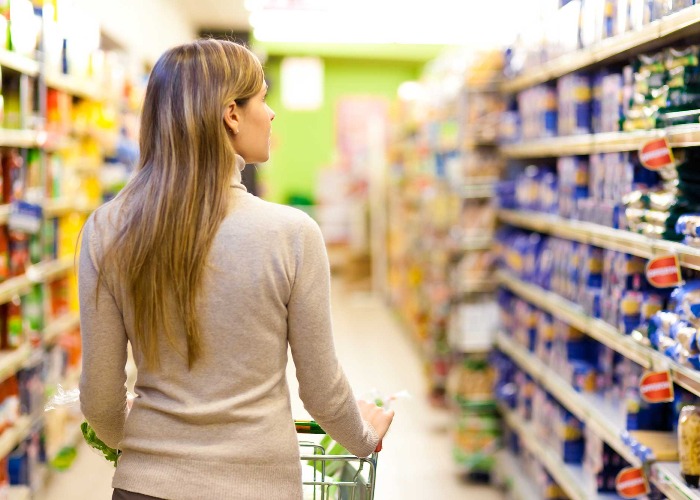Food prices: supermarkets hike costs of basic range goods

Study finds supermarkets of all kinds are increasing the costs of their own-range items.
If you’re trying to keep your supermarket shopping costs to a minimum, then moving from premium brands to the store’s own basic range is a straightforward way to do so.
However, new research suggests that just as branded items are becoming more expensive at our major supermarkets, so too are the costs of basic range goods.
A new study by NationalWorld saw the site track the price of almost 700 basic range products at some of the nation’s main supermarkets: Tesco, Sainsbury’s Asda, Morrisons and Aldi.
It took an online price snapshot on 4th April, the first Monday of the month, and then repeated the exercise on 2 May.
And it found that there were three times as many products seeing price rises (102 items) as price falls (34 items).
These increases aren’t so small that you’d barely notice either, with some items jumping in price by as much as 33%.
This is bad enough, but NationalWorld points out that some of the items seeing price rises have already been subject to price hikes earlier this year, simply making them even more costly than shoppers were used to.
So which supermarkets were behind the most increases?
Rising prices
The supermarket most likely to increase prices was Asda. It increased prices on 37 out of 158 SmartPrice or Farm Stores products over the period, with 18 products dropping in price.
The largest price increases were on tins of mushy peas and six-packs of kiwis, which rose by 16.7% and 16.4% respectively.
This is particularly notable given Asda’s recent push on competing on prices.
For example, in April it announced it was ‘dropping and locking’ the prices of 100 popular items, pledging to keep the prices low for the remainder of the year, while it is also launching a new Just Essentials range to replace the old Smart Price budget range.
Just this week, it launched a price-matching scheme with Home Bargains too.
Of course, it’s worth remembering that Asda is consistently found to be the cheapest of the big supermarkets, though that doesn’t take away from the fact that evidently shopping there is still becoming more expensive.
Tesco was the next most likely to hike prices, with 19% of the budget items being tracked increasing in cost over the month.
What’s more, some of these prices were particularly notable.
For example, Eastman’s chicken and bacon paste jumped by 30.3%, while Grower’s Harvest Pure apple juice and orange juice both rose by 23.9%.
Sainsbury’s meanwhile increased prices on 15% of the budget items being tracked, with hikes of up to 25% taking place.
Fighting food inflation
It’s no secret that the UK is in the midst of a severe cost of living crisis.
Ordinary workers are not only having to deal with a rising tax burden which means they take home a smaller proportion of their earnings, but the costs of seemingly everything they have to buy have been rising too.
Food shopping is certainly not an exception to this. The latest figures from Kantar WorldPanel show that food inflation is now at 5.9%, its highest level since December 2011.
In its report, the analysts pointed out that typical households face spending an extra £271 per year as a result, with a lot of this going on “non-discretionary, everyday essentials which will prove difficult to cut back on as budgets are squeezed”.
In other words, prices aren’t just rising on luxury goods ‒ even if you are incredibly disciplined, to the point that you only buy the most essential items, you’ll still end up facing a higher bill than you would have just a month or two ago.
It’s clear that supermarkets are well aware of the money issues that people are facing, which is why they are so publicly launching money-saving promotions, whether that’s price-matching schemes, new budget ranges, or some other measure.
But if those promotions don’t make a tangible difference to their budgets, then shoppers will end up moving to cheaper stores.
After all, there’s a good reason that the likes of Aldi and Lidl have seen their position strengthen of late.
This is only likely to continue as budgets continue to be stretched.
Comments
Be the first to comment
Do you want to comment on this article? You need to be signed in for this feature